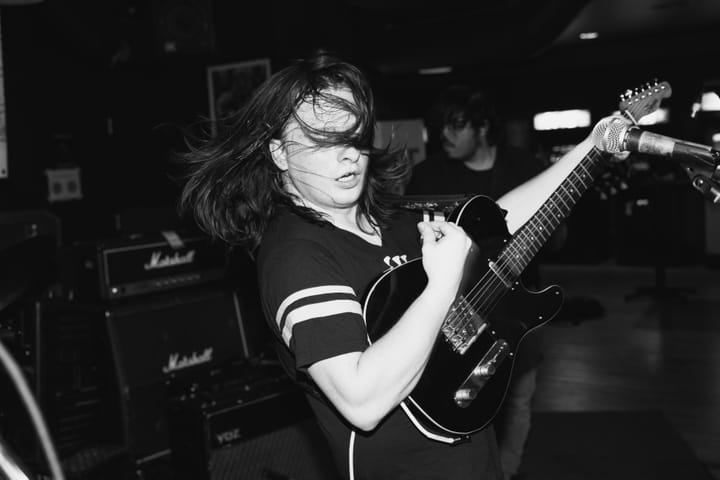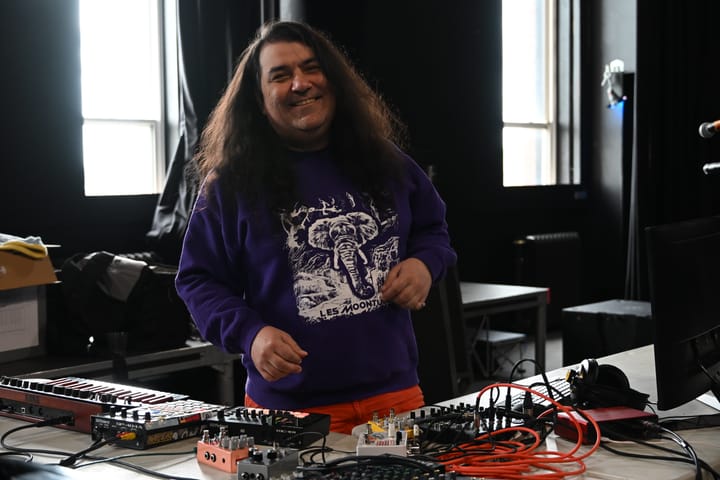
Godspeed You! Black Emperor at History on Election Night
Godspeed You! Black Emperor weren’t supposed to spend the U.S. presidential election night at Drake’s nightclub in the Beaches, but here we are. Originally slated for the Concert Hall, the Toronto stop of their Liberation Autumn of ‘24 tour was only relocated to History after ticket sales prompted promoters to source a bigger room for the booking. And yet, it’s difficult to imagine a more appropriately named venue for tonight’s show.
Leading up to this night, both sides of the aisle have spent the better part of the last four years campaigning against each other, claims that this is (once again) “the most important election of our lifetime” increasing in volume with each day. Equating any support for a third-party or independent candidate with a wasted vote, the status quo rightly identifies concrete organizing as a threat and dispatches it as efficiently as it can.
Coupled with a further failure on the part of President Joe Biden and Vice President Kamala Harris’s campaign to take a meaningful stance against Israel’s ongoing genocide of Palestinians, there’s a lot to feel alienated about in the discourse surrounding tonight’s election.
But hope is in the air at History as Godspeed spend the better part of two hours in speechless dialogue with the march of time and its violent erasure of the future, while everything worth saying has already been said.
The Montreal collective’s eighth studio album, “NO TITLE AS OF 13 FEBRUARY 2024 28,430 DEAD,” arrived just last October, and with it came a challenge to fans, the music press, and post-rock brones everywhere to acknowledge the genocide, referring directly to the Gaza Health Ministry’s reported number of Palestinians brutally unalived by the imperial West between October 7, 2023 and February 13, 2024.
“NO TITLE= what gestures make sense while tiny bodies fall? what context?” the band questioned in the statement accompanying the album’s announcement, “and then a tally and a date to mark a point on the line, the negative process, the growing pile.” (At the time of publication, the Gaza Health Ministry places the death toll at 45,059.)
Just like History’s marketing winks at a present actively being hurled into the past, popular political discourse’s emphasis on the election process obfuscates present-day organizing and tangible, direct paths to political change. This erasure of the present initiates a narrowing of the collective temporal understanding — rich, tangled processes of struggle with traceable pasts, presents, and possible futures are flattened into an ever-diminishing present, and the future feels further out of reach.
So when a bartender indelicately notes how prominent keffiyehs are amongst the audience (he mistakenly refers to them as flags) and asks my friend, “Is this a political band?” it feels like a direct testament to the effectiveness of empire, the resignation that enables it, Godspeed’s counter-populism, and the mettle of pro-Palestinian resistance in the wake of so much bullshit and gaslighting.
Godspeed concerts are remarkably consistent. Aside from the tracks on a given night’s setlist, there are not bound to be any significant surprises. There are no vocal microphones set up, and they will not address the audience, except perhaps quietly upon arrival or when parting the stage. If there has to be a point, it’s to come together and engage with global material conditions, free of authoritative figures to tell you what to think. The eight members will keep their heads down, play their instruments, and facilitate collective reckoning while projectionists Karl Lemieux and Philippe Léonarda match musical cues with live-manipulated analogue film loops.
Opening the night as they’ve typically done since reforming in 2010, Godspeed begin by droning at length while the word “HOPE” flickers on the screen behind them. As members gradually enter the stage and join in the drone, I’m struck by what that sentiment has weathered since Barack Obama hawked it with Shepard Fairey’s bastardized riff on the Socialist Realist aesthetic in 2008. Stripped of any propagandistic baggage, Godspeed’s messaging looks like it could have been scrawled by anyone. Seemingly etched freehand directly into the film’s emulsion, it’s an important reminder that in spite of the political spectacle playing out as poll results roll in, hope remains indelible and spreads through tangible means, building on collective memory and ongoing resistance.
After tonight’s hope drone, Godspeed play all of “NO TITLE AS OF 13 FEBRUARY 2024 28,340 DEAD” except for “BROKEN SPIRES AT DEAD KAPITAL.” Playing G_d’s Pee AT STATE’S END’s “Fire at Static Valley” in its place in the album’s sequencing, the setlist trades one bleak, charred landscape for another. In doing so, Godspeed tether a more recent moment of witness-bearing to a continuum of active reckoning.
Capping off the set with “First of the Last Glaciers” and “Piss Crowns Are Trebled,” the finale drives home the environmental toll of forever wars and the basic principle that the hegemonic powers that be aren’t going to hold themselves accountable. As the final notes of “Piss Crowns” loop into a noisy squall, and the band slowly disappears, it strikes me that the basic premise of “Godspeed You! Black Emperor at History on election night” and its required suspension of prepositional convention itself reads like a puckish title that could be ripped directly from the spine of one of their LPs or tracklistings.
The tour T-shirts on sale at the band’s merch booth also hammer home the message of persistent, gradual change, trading out venue and city names on their list of tour dates for historical events or otherwise simply declaring “FREE PALESTINE.” Tonight’s tour date notes the “CHRISTIE PITS RIOT,” referencing an anti-Semitic 1933 riot that broke out when Nazi supporters descended on a local baseball match.
Trauma isn’t interchangeable, but we can always look to how we’ve endured previous strifes to inform how we move forward. In fact, we have to. Time isn’t a renewable resource, and how we spend our political energy is of critical importance.
At its core, Godspeed’s music speaks to a living history of collective resilience, insisting that hope lives in spite of overwhelming darkness. It is a reminder that while electoral politics and the dominant discourse may narrow our understandings of history to an instant, their victories are just as temporary and tenuous.
Read more

Sentries: Multifaceted Noise Rock

Step Into Little Stone Crow's World

